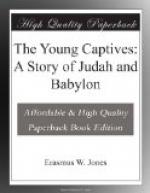CHAPTER VI.
Nebuchadnezzar called together a number of the leading men of Judah and explained his intentions with regard to the government. He also described the killing of Jehoiakim. It was not the policy of the conqueror to establish any rigorous system of public control. He required that Judah should remain as a tributary power, but he desired the country to make progress in its own way, and he took occasion to proclaim that Jeconiah should reign in the place of his father, Jehoiakim, who had just met his fate at the hands of the invader. Those who listened to Nebuchadnezzar were well pleased with his words and also with the elevation of Jeconiah to the throne.
The Babylonian ruler, having now fully accomplished his ends, gave orders for the early departure of the victorious army for the plains of Chaldea. He decided to take with him, as prisoners of war, a number of youths of Judah. He had the twofold object of showing to his people some tangible evidence of his victory and of gaining for his court the advantage of having as aids and attendants some of the more cultured young men of Judea. With the aid of Jeconiah a list of suitable youths was soon prepared by the victorious monarch’s officers. These chosen ones were notified, the day of departure was fixed, and all energies were bent toward the speedy return of the army to the land of the Euphrates.
. . . . . . .
Let us now visit some of the homes of Judah, where the mandate of the Babylonian king had fallen as a pall upon the inmates. With one of these homes, located centrally and bearing evidence of prosperity and culture, the reader is already somewhat acquainted. In the room where young Ezrom took leave of his sisters, twenty-five years before, an interesting group had gathered. Monroah, the last survivor of Salome’s children, had wedded Amonober, and four lovely children blessed their union. These youths were now orphans, however, the youngest being a maiden of sixteen, who possessed the rare beauty for which the family was noted. Her name was Perreeza. The three brothers were named Hananiah, Mishael and Azariah. The love of these brothers for their sister was returned with all the ardor of an affectionate and sincere girl. These youths were among those selected as prisoners of war.
In company with the young men, when they broke the news of the king’s decision to Perreeza, was Jeremiah the Prophet.
“Oh, brothers!” exclaimed the distressed maiden, “must ye be torn away from an only sister? Oh, man of God! What will Perreeza do? My heart will break. Oh, my brothers! We cannot part!” and she fell on the neck of Hananiah and wept bitterly.
“We think it not strange, dear damsel,” said the prophet, “that thy young heart is made sad. But the things that are enshrouded in mystery to-day will yet beam forth in wondrous wisdom.”




